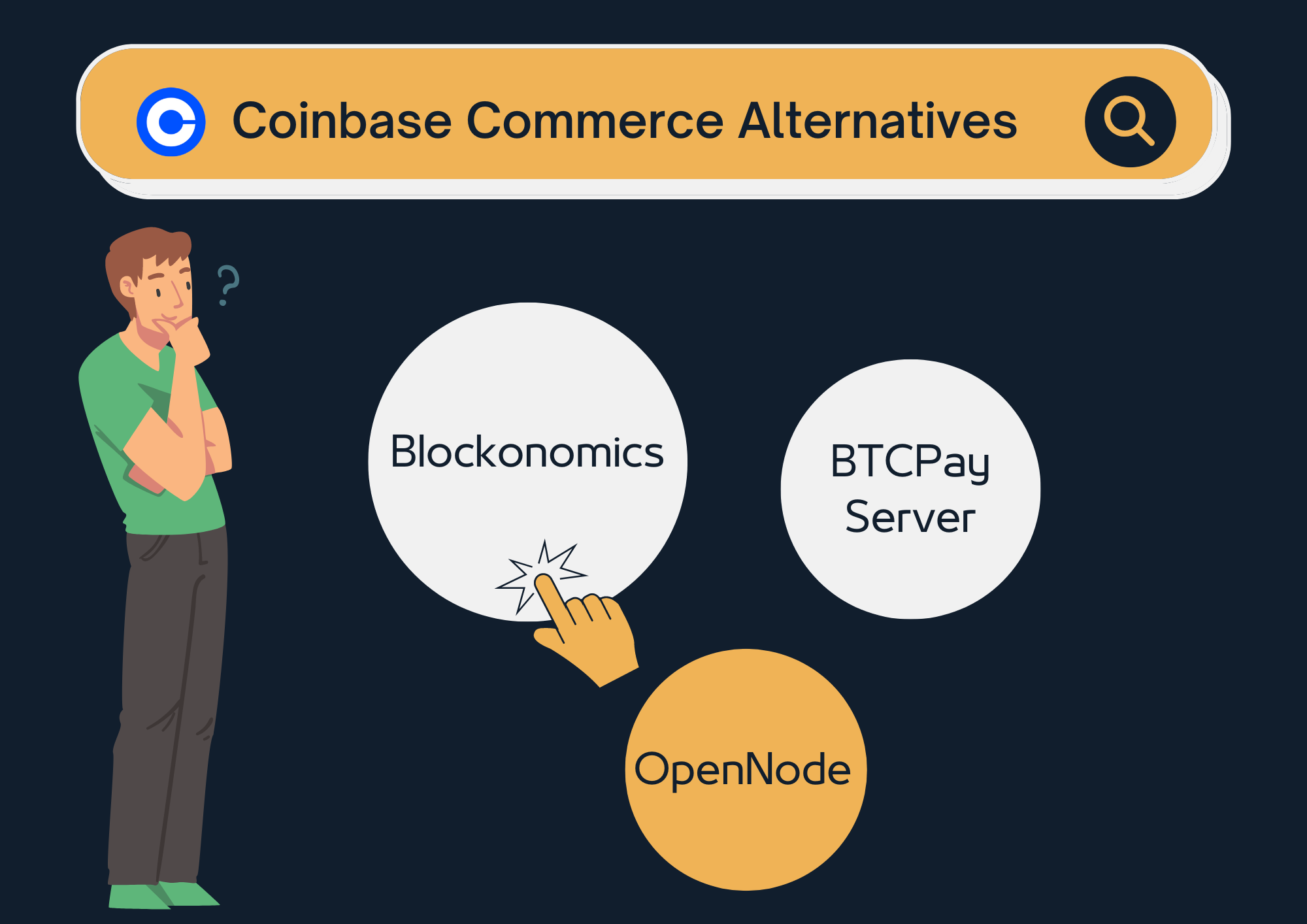Coinbase Commerce Lets Us Down: Top Bitcoin Payment Alternatives
Frustrated with Coinbase ending native support for Bitcoin? We've rounded up the best and reliable Bitcoin payment alternatives for you.

In a surprising move that has sent ripples through the digital commerce sector, Coinbase Commerce announced it would be ending native support for Bitcoin payments. This decision marks a significant pivot in the cryptocurrency payment landscape, leaving merchants and online businesses scrambling to find reliable, user-friendly alternatives that support Bitcoin. With the growing demand for cryptocurrency transactions in e-commerce, finding a platform that offers seamless integration, security, and a wide range of supported cryptocurrencies has become paramount. This article delves into the top three alternatives to Coinbase Commerce, starting with Blockonomics, a pioneer in the space, and covering two other notable platforms that promise to keep the crypto payment ecosystem vibrant and accessible.
Table of Contents
- What the Coinbase Decision Means
- What to Look for in an Alternative
- Coinbase Commerce Alternatives
- Conclusion
- Frequently Asked Questions
What the Coinbase Decision Means
Coinbase announced last week that it was ending native support for Bitcoin. This decision sent shockwaves through the Bitcoin community and it shows some of the dangers that large Crypto companies can bring to the ecosystem. Coinbase started because of Bitcoin and has now decided to completely abandon it because it doesn’t give them the control they want. They cited problems with the UTXO model or Unspent transaction output. But that is a cop-out.
Instead, Coinbase will now require all customers to sign up for a Coinbase account if they want to pay in Bitcoin. They will have to have it done entirely through Coinbase’s ecosystem. As one Twitter user pointed out: “That’s like dictating that every customer has to be a Bank of America customer for merchants who simply bank with BofA to accept payments.”
This isn't quite right, so let me share some more context in case helpful:
— Brian Armstrong 🛡️ (@brian_armstrong) February 17, 2024
- Commerce uses a new EVM payment protocol.
- You can pay from any self-custody wallet
- We believe paying with crypto is going to primarily happen on Layer 2 in the future and we want to help make that…
Why is Coinbase doing this? Control. Bitcoin is a decentralized currency, and it works to keep itself decentralized. Through its structure, Bitcoin does not allow any group to exercise complete control over it. As Coinbase has grown, it has shown that it wants control. Control over user data, control over the cryptocurrency transactions, control over anything it can. That’s the nature of large corporations. They want to milk dry as much money as possible.
And this decision is part of that. Bitcoin was not allowing them to have that control, and so they ditched it. That is bad news for their customers, merchants who use Coinbase to allow people to pay for their goods and services. If they do this unilaterally, imagine what else they will do? By forcing your customers to sign up for a Coinbase account, there will now be another barrier to checking out at your store. You will lose customers. It is time to look for Coinbase alternatives.
What to Look for in an Alternative
There are a variety of things to look for in Coinbase alternatives. It all depends on what you were using Coinbase for in the first place. Coinbase as a Bitcoin payment solution operated on a few fundamentals: they were custodial and they had KYC. This created problems for them and their customers.
Being custodial meant that they held onto the Bitcoin that was paid in a transaction. When buying something from a store that uses Coinbase, your Bitcoin doesn’t go directly to the merchant or the store owner. Instead, the crypto transactions go to Coinbase where it is deposited into a Coinbase account attached to the store owner. This means you, as the store owner, would have to take that Bitcoin out of the account and move it into a safe space. Custodial wallets, like Coinbase, are susceptible to hacking attempts and account closures. If Coinbase had money issues, they could freeze the accounts and hold your money. This has happened before with other companies and exchanges.
Additionally, KYC added problems with data security. Coinbase requires a lot of data to open up an account, and that data is not always completely safe. Companies are always susceptible to data breaches, and the more data you provide, the more can be breached. By sticking with a company that has limited to no KYC, that data is at risk.
There’s also a need for trust. Coinbase lost a lot of trust with this decision. They can unilaterally make changes to their model, dropping customers, on a whim if it will make them an extra buck. Finding a payment gateway that won’t do that is key.
And of course, you want to find a company that specializes in Bitcoin. You’re using Bitcoin for a reason, and Coinbase has now left you high and dry. Find a company that appreciates Bitcoin, that loves it for what it is.
Coinbase Commerce Alternatives
| Feature | Blockonomics | BTCPay Server | OpenNode |
|---|---|---|---|
| Direct-to-Wallet | Yes | Yes | No |
| KYC | No | No | Yes |
| Non-custodial | Yes | Yes | No |
| Fee | 1% | 0% | 1% |
| Supported Cryptocurrencies | Bitcoin, Bitcoin Cash | Bitcoin, Dogecoin, Monero | Bitcoin |
| Support Quality | Excellent | Poor | Good |
| Security | High (generates new address per transaction, no KYC) | High (direct-to-wallet, no KYC) | High but not direct-to-wallet |
| Privacy | Enhanced (no KYC, new address per transaction) | Enhanced (no KYC) | Easier (plugins for e-commerce platforms, API, hosted checkout, payment buttons) |
| Installation process | Plugins , payment links/buttons, API, HTML | Plugins for CMSs, API | Plugins, API, hosted checkout, payment buttons |
Without further ado, let’s explore the top three alternatives:
1. Blockonomics
Blockonomics is one of the direct-to-wallet payment gateways. It allows funds to go from the customer to the store owner directly with no middleman holding the funds. Founded in 2015, it is one of the more established players on the block. It allows businesses to accept Bitcoin and Bitcoin Cash. It has high customization depending on what you’re looking for, it can be used by very tech-savvy people or developers, or it has plugins that are super quick and simple to set up.
It has proven time and time again that it believes in Bitcoin’s mission. It provides top-notch care to its employees and its customers and does not abandon them.
→ KYC: No
→ Non-custodial: Yes
→ Fee: 1%
→ Support: Excellent
🛡️Security and Privacy
Blockonomics is well known for its security. Because it is direct-to-wallet, it makes your crypto more secure.
Additionally, Blockonomics requires no KYC so both you and your customer’s privacy are protected. Finally, Blockonomics generates a new address with each transaction so no one can track your cryptocurrency wallets.
🛠️Installation Process
One of the main benefits of Blockonomics is that it allows users to have a variety of install options. For those small business owners who want ease of installation, there are plugins for a variety of e-commerce platforms including WordPress/Woocommerce, WHMCS, PrestaShop, and OpenCart. Additionally, it offers easy-to-use payment links and buttons that can be used on sites that don’t have a plugin available.
Additionally, for the more technically-minded, there are opportunities for in-depth installations. Blockonomics has an API that can be integrated, as well as an HTML payment method, and more. The sky’s the limit with the options that are provided.
2. BTCPay Server
BTCPayServer is well known in the Bitcoin community as a powerful crypto payment gateway. It is also direct to wallet just like Blockonomics, and offers a lot of flexibility. This is the alternative if you thought Coinbase had no customization at all.
It offers a small number of crypto payments in addition to Bitcoin including Dogecoin and Monero. However, its setup is technical and not recommended except for the more advanced users.
→ KYC: No
→ Non-custodial: Yes
→ Fee: 0
→ Support: Poor
🛡️Security and Privacy
BTC PayServer is well known for its security and privacy. It is direct-to-wallet and so is very protected against hacks, and privacy is secured through various means such as not having KYC. However, because it requires more set up it can mean that you have to have more security on your personal device.
🛠️Installation Process
BTCPay Server offers plugins for major CMSs as well as API for custom integration but as mentioned, the setup is slightly more technical than existing options in the market, which may be its biggest drawback.
3. OpenNode
OpenNode is a long-standing payment gateway that has been in the market for more than 5 years now. It specializes only in Bitcoin transactions and offers features such as lightning transactions, fiat conversions, and in-person checkouts.
It offers integrations for most major CMSs including, Shopify, BigCommerce, WooCommerce, Magento, PrestaShop, and OpenCart, as well as payment buttons and hosted checkouts.
→ KYC: Yes
→ Non-custodial: No
→ Fee: 1%
→ Support: Good
🛡️Security and Privacy
OpenNode claims to have strong security, largely because it only allows Bitcoin payments. However, it is not direct-to-wallet which creates security concerns.
It offers BTC payouts as two options, scheduled and on demand.
On the privacy side, it does require KYC for its customers, individuals, and businesses alike, so if you are looking for an anonymous payment gateway this may not be an option for you. If you appreciated Coinbase’s KYC methods, this one is the best fit.
🛠️Installation Process
OpenNode offers plugins for popular e-commerce platforms like Woocommerce and Prestashop. It also offers API integrations so coders would also be able to create a more in-depth payment crypto platform.
It additionally offers hosted checkout which offers a much faster integration as the checkout page is hosted on open-node servers. And Payment Buttons which can be integrated into any website as a button.
Conclusion
In conclusion, Coinbase has left us hanging. Their stopping native Bitcoin payments is a slap in the face of the crypto community. Bitcoin is the most popular crypto, especially for payments, with thousands using it every day. If you want to tap into that market as a store, you have to switch, and switch soon, or you will lose Bitcoin payments. Apparently, Coinbase wants it that way.
Frequently Asked Questions
How do I transition from Coinbase to a new Bitcoin payment alternative seamlessly?
Look at the guides and support resources provided by the chosen alternative to facilitate a smooth transition, including transferring funds, updating integration settings, and communicating changes to customers.
How do I ensure the security of Bitcoin payments with alternative services?
Look for features such as multi-signature wallets, cold storage options, and robust encryption protocols. Additionally, researching the security track record and reputation of the service provider is crucial.
Can I access historical transaction data and generate reports for accounting and auditing purposes from Coinbase?
Yes, you can. From your account profile, go to Statements > Transactions to download your transaction statements.
Further Reading
BitPay or BitBeyond: Exploring the World of BitPay Alternatives
How to Easily Add Bitcoin Payment to Your Website


Comments ()